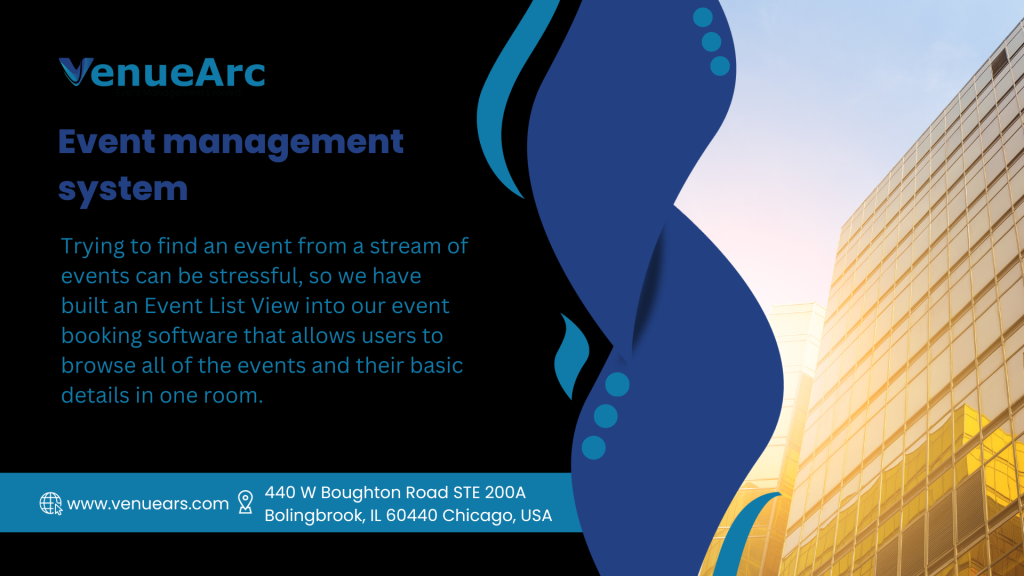
Introduction
The world of event planning has witnessed a profound transformation in recent years, thanks to the advent of Event Management System. These sophisticated software solutions have revolutionized the way events are organized, managed, and executed. Gone are the days of painstakingly managing every detail on paper, wrestling with endless spreadsheets, and dealing with logistical nightmares. In this article, we will explore the capabilities, advantages, and impact of Event Management System, and how they have become indispensable tools in the hands of event professionals.
What is an Event Management System?
An Event Management System is a comprehensive suite of software tools designed to facilitate and simplify the entire event planning process. These systems are engineered to assist event planners, coordinators, and managers at every stage, from the initial concept to the post-event analysis.
The Evolution of Event Management Systems
The journey of EMS has been marked by innovation and adaptation. The first EMS solutions were primarily focused on streamlining specific tasks, such as attendee registration. Over time, they evolved into all-encompassing platforms capable of managing every aspect of an event. Today’s Event Management Systems are versatile, scalable, and customizable, catering to the diverse needs of various events, from small corporate meetings to large-scale conferences and festivals.
Key Features of Event Management Systems
a. Online Registration and Ticketing
One of the primary functions of an EMS is to facilitate online registration and ticketing. Attendees can easily sign up for events, choose their preferred ticket type, and complete payments online. This process not only reduces the workload of event organizers but also enhances the overall attendee experience.
b. Event Promotion
EMS often includes marketing and promotion features. Event organizers can create event landing pages, send out invitations, and leverage social media integrations to reach a broader audience, increasing event attendance.
c. Communication and Engagement
Effective communication is vital in event planning. Event Management Systems provide tools for sending automated reminders, updates, and personalized messages to attendees, speakers, and sponsors. These features help ensure that everyone is well-informed and engaged.
d. Real-time Analytics
Understanding how an event is performing is crucial for event organizers. EMS offers real-time analytics that allow organizers to track ticket sales, monitor attendance, and gather feedback. This data is invaluable for making informed decisions and improving future events.
e. Comprehensive Agenda Management
Managing the schedule, speakers, and sessions is a complex task for larger events. EMS simplifies this by providing a centralized platform for creating, updating, and communicating the event schedule to attendees.
f. Vendor and Sponsor Management
Events often involve multiple vendors and sponsors. EMS allows organizers to efficiently manage these relationships, including vendor contracts, payments, and sponsorship agreements.
g. Data Security
Data security is a top priority in the event planning industry. Event Management Systems ensure that sensitive information, such as attendee data and financial transactions, is secure and compliant with data protection regulations.
Also read about: The Unsung Heroes of Modern Battery Technology
Benefits of Event Management Systems
a. Efficient Registration and Ticketing
EMS automates the registration and ticketing process, making it simple for attendees to sign up, select their tickets, and make payments. This not only saves time but also enhances the attendee experience.
b. Streamlined Communication
Effective communication is a critical element of successful event planning. EMS provides tools for sending automated reminders, updates, and personalized messages to attendees and stakeholders, ensuring everyone is on the same page.
c. Simplified Event Promotion
EMS allows for easy event promotion through the creation of event pages, sending invitations, and leveraging social media integrations. This not only saves time but also increases event visibility, leading to higher attendance.
d. Real-time Analytics
The ability to access real-time event data is invaluable. Event organizers can track ticket sales, monitor attendance, and gather feedback in real-time, providing them with the insights needed to make informed decisions.
e. Comprehensive Agenda Management
Managing event schedules and sessions is a breeze with EMS. Organizers can create, update, and communicate the event schedule from a centralized platform, ensuring that attendees are well-informed.
f. Vendor and Sponsor Management
EMS streamlines the management of vendors and sponsors by handling contracts, payments, and agreements in one place. This not only saves time but also ensures efficient relationships with external parties.
g. Data Security
The security of sensitive event information is a primary concern. EMS ensures that data, including attendee information and financial transactions, is kept secure and compliant with data protection regulations.
Case Study: Success with Event Management Systems
After implementing a robust EMS solution, Eventer experienced a significant transformation:
- Registration and ticketing became streamlined, with attendees enjoying a user-friendly registration process.
- Eventer leveraged the software’s marketing features to increase event visibility and attract more sponsors.
- Real-time analytics enabled Eventer to monitor ticket sales, adapt their marketing strategy, and make data-driven decisions.
- Attendees were more engaged with the event through the mobile app, accessing the schedule and receiving timely updates.
- Onsite check-in processes were efficient, reducing waiting times and enhancing the overall event experience.
In conclusion, Event Management Systems have revolutionized the event planning industry by providing a comprehensive suite of tools and features that streamline the planning and execution process. Event organizers can benefit from increased efficiency, improved communication, and enhanced attendee experiences. As technology continues to advance, we can expect Event Management Systems to play an even more prominent role in shaping the future of event planning. Whether you’re planning a small business meeting or a massive music festival, Event Management Systems can be your key to success.
Must Read: How to Boost Event Engagement with Technology Gadgets?